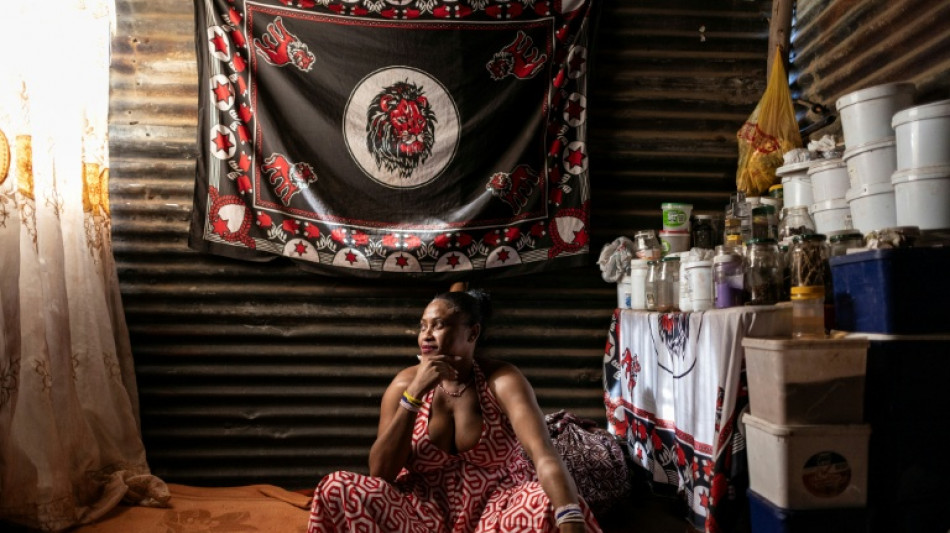
-
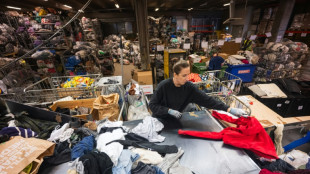 Sweden drowns in discarded fast fashion items
Sweden drowns in discarded fast fashion items
-
Rybakina powers Kazakhstan into Billie Jean King Cup finals

-
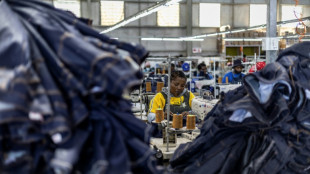 Despite US tariffs pause, southern African economies under threat
Despite US tariffs pause, southern African economies under threat
-
A night at the Geneva opera -- that is a literal snoozefest

-
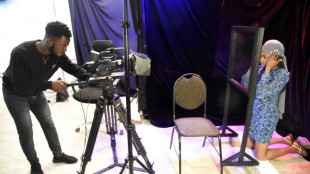 Cash-strapped Nigerians turn to YouTube for entertainment
Cash-strapped Nigerians turn to YouTube for entertainment
-
Two dead as fans, police clash before Copa Libertadores game in Chile

-
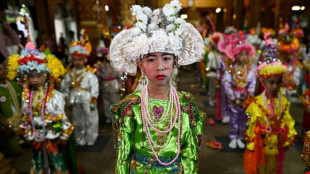 Flowers in their hair: Shan boys ordained into Buddhist monkhood
Flowers in their hair: Shan boys ordained into Buddhist monkhood
-
Edwards leads Wolves past Grizzlies as playoff race heats up

-
 Ancelotti questioned as Real Madrid face Alaves
Ancelotti questioned as Real Madrid face Alaves
-
Old foes Bayern and Dortmund face off amid spectre of European exit

-
 Early holiday, more fans: Philippines schools adapt to climate change
Early holiday, more fans: Philippines schools adapt to climate change
-
In skies, as on land, European forces face gaps if US pulls back

-
 Digital divas: Can Japan's virtual YouTuber craze crack America?
Digital divas: Can Japan's virtual YouTuber craze crack America?
-
WHO pandemic agreement talks face deadline crunch

-
 Stocks, dollar sink and gold hits record as Trump tariff panic returns
Stocks, dollar sink and gold hits record as Trump tariff panic returns
-
LeMond hails 'one in a million' Pogacar ahead of Paris-Roubaix debut
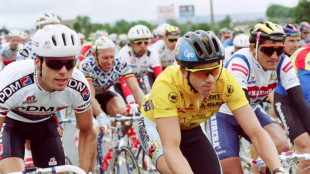
-
 Liverpool can move closer to the title as top five tension mounts
Liverpool can move closer to the title as top five tension mounts
-
Trump admits trade war 'cost' as markets hit

-
 AI only just beginning to revolutionize the NBA game
AI only just beginning to revolutionize the NBA game
-
Despite Trump pause, overall US tariff rate at highest in a century

-
 'A pain that doesn't subside' at funerals for Dominican nightclub disaster victims
'A pain that doesn't subside' at funerals for Dominican nightclub disaster victims
-
Panama deal allows US to deploy troops to canal

-
 US firm says it brought back extinct dire wolves
US firm says it brought back extinct dire wolves
-
Grieving Dominicans start burying 220 victims of nightclub disaster

-
 Aberg closes strong at 'sneaky hard' Augusta National
Aberg closes strong at 'sneaky hard' Augusta National
-
US auto union praises some Trump tariffs

-
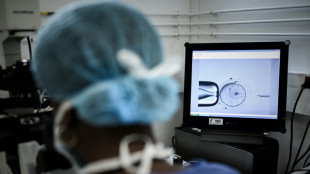 Australian IVF clinic admits embryo mix-up
Australian IVF clinic admits embryo mix-up
-
Rose: I've played well enough to win Masters but lack the jacket

-
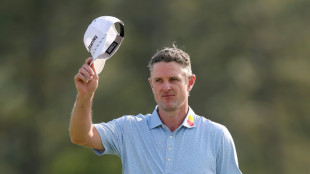 Rose again enjoys 'luxury' of first-round Masters lead
Rose again enjoys 'luxury' of first-round Masters lead
-
Rose rockets to Masters lead, defending champ Scheffler in pursuit

-
 Tesla opens first showroom in oil-rich Saudi
Tesla opens first showroom in oil-rich Saudi
-
Oscars to add new award for stunts

-
 Hatton loves being at Masters but 'It's just so hard'
Hatton loves being at Masters but 'It's just so hard'
-
'Mistakes can happen': Amorim backs Onana after Lyon nightmare

-
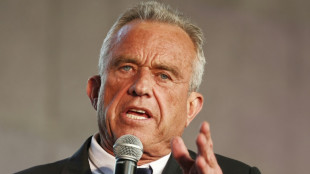 RFK Jr says study will reveal cause of autism 'epidemic'
RFK Jr says study will reveal cause of autism 'epidemic'
-
Tourist family, pilot killed in 'tragic' NY helicopter crash

-
 No.1 Scheffler makes strong Masters start to defend title
No.1 Scheffler makes strong Masters start to defend title
-
Man Utd and Spurs draw in Europa League, Rangers hold Athletic

-
 Rose rockets to Masters lead with Scheffler and McIlroy in pursuit
Rose rockets to Masters lead with Scheffler and McIlroy in pursuit
-
Man Utd held late in Lyon after Onana errors in Europa League

-
 Man Utd held late in Lyon after Onana errors
Man Utd held late in Lyon after Onana errors
-
Wall Street rally fizzles as tariff fears resurface

-
 MLS to open 'second phase' of major season overhaul study
MLS to open 'second phase' of major season overhaul study
-
Argentina braves 24-hour strike as it awaits word on IMF loan

-
 Spain's Ballester finds relief in Masters water hazard
Spain's Ballester finds relief in Masters water hazard
-
Porro rescues Postecoglou as Spurs held by Frankfurt

-
 Grieving Dominicans start burying 200+ victims of nightclub disaster
Grieving Dominicans start burying 200+ victims of nightclub disaster
-
CONMEBOL proposes one-off 64-team World Cup in 2030

-
 Rybakina on form for Kazakhstan in BJK Cup
Rybakina on form for Kazakhstan in BJK Cup
-
Former Real Madrid coach Leo Beenhakker dies aged 82


'Don't want to die': Lesotho HIV patients look to traditional medicine
In a sunlit shack on the outskirts of Lesotho's capital Maseru, 34-year-old Lieketseng Lucia Tjatji sits under a black cloth pegged to a tin wall and emblazoned with the head of a lion.
To her left, a wooden table is weighed down by containers of roots, powders and dried herbs, remedies she now offers to HIV patients who have been cut off from vital medication after US President Donald Trump's aid freeze in February.
"I am a traditional doctor or a witch doctor," Tjatji says, her voice steady. "I have helped people. More and more are coming."
They are the desperate of a nation buffeted by poverty and gripped by one of the highest HIV rates in the world with roughly one in four adults living with the virus, according to government data.
Tjatji, too, is HIV positive. A registered traditional healer and fashion designer, she concedes doctors question the efficacy of the treatments she dispenses while urging those on ARVs not to mix their medicines with anything not clinically tested.
But with the government-supplied antiretrovirals she has taken diligently since 2003 now limited to three-month refills because of Trump's cuts -- and no guarantee of more, Tjatji is left with few options.
"I don't want to die. I am so young and I don't want to die," she told AFP.
- 'Holistic health' -
Traditional healers, known as sangomas, are respected by many across southern Africa for their healing abilities and their spiritual guidance.
Many sangomas once viewed HIV as a curse from the spirit world, believing patients had been bewitched. Some even claimed they could cure AIDS.
New practitioners, like Tjatji, undergo lengthy initiation and training before they are permitted to administer remedies passed down through generations.
With the USAID cuts putting access to modern medicine out of reach, it is only natural for people to turn to a traditional system established over time, said Mpho Roberta Masondo, director at the South African-based African National Healers Association.
"Traditional medicine plays a vital role in holistic health and community well-being," Masondo, also a traditional healer, told AFP.
At the same time, says Masondo, antiretroviral therapy "remains the most effective way to suppress HIV."
- Unrolling gains -
Since 2016, Lesotho -- a small mountainous kingdom surrounded by South Africa -- has received over $850 million in HIV funding from Washington.
The support came through the President's Emergency Plan for AIDS Relief (PEPFAR), the US government's primary programme for combating HIV.
After a complete halt in February, only 28 percent of PEPFAR support had resumed in Lesotho by mid-March, according to the UN AIDS agency.
Nearly half of programmes it funded had been terminated, including for HIV prevention through PrEP medication (pre-exposure prophylaxis) or male circumcision.
The cash-strapped health ministry is ill-equipped to fill the gap.
Health Minister Selibe Mochoboroane told parliament in March that the 2.4 billion maloti ($127 million) budget for the 2025-26 financial year did not take into account any US pullback from its foreign aid commitments.
- 'Ineffective treatment' -
Experts worry that turning to alternative remedies could undo progress in fighting HIV in Lesotho, which five years ago achieved the UN's "90-90-90" goal of 90 percent of people with the virus being diagnosed, on treatment and achieving viral suppression.
"I'm quite worried," said Jessica Justman, senior technical director at ICAP, a global health centre at New York's Columbia University.
"Using ineffective treatment is the equivalent of not taking any treatment at all," she said. It opens people living with HIV to opportunistic infections like TB, meningitis and pneumonia, she said.
Still, Masondo insists, traditional methods can offer relief.
"Traditional healing is not just about the herbs; it's a holistic, comprehensive approach that strengthens the body, mind, and spirit," she said.
"The ultimate or the real danger is not traditional healing itself, it's misinformation," she said.
In the shack that serves as her consulting room, Tjatji said she fears that alternative medicines may not help her because her system may have become accustomed to regular antiretroviral treatment.
Her main concern is that HIV will open her to a new bout of TB, she said, wondering if her government may find a way to help in the face of apparent US indifference.
"Maybe Lesotho will make a difference and produce the pills for us."
F.Stadler--VB
